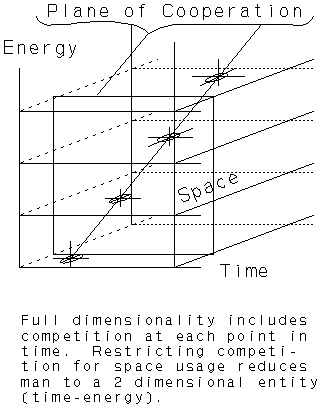The General Semantic 'Ethic' of Cooperation
© Copyright 1986 by Ralph E. Kenyon, Jr.
There has developed an 'ethic' of cooperation within the community of general
semantics. They reason that, because man 'is' (is described as) a time-binding
class of life, and that cooperation enhances time-binding, it follows that
competition, which enhances space-binding, diminishes time-binding, and is
therefore to be eschewed.
This reasoning is simplistic and fails to understand that the space-binding
and time-binding dimensions are independent. The view is essentially
'one-dimensional' in that the dimension of time-binding is 'aligned' with the
'reverse' of the dimension of space-binding, so that 'more' time-binding happens
coincidentally with 'less' space-binding and conversely. This 'one-dimensional'
view is not consistent with a close examination of general semantics.
The dimensions of energy-binding, space-binding, and time-binding are not a
classification scheme whereby something fits into one of them and not the
others; it is a dimensional ordering where something has some (greater or
lesser) degree of each dimension.
Plants predominate on the energy-binding dimension, but as they grow, they
compete for space, albeit rather slowly, and so engage in a limited degree of
space-binding; the mechanism of evolution allows 'communication' over time about
successful survival mechanisms, so there is even a very limited and special kind
of time-binding (which we and animals also share).
Animals predominate on the space-binding dimension, but many species must
'learn' adult behavior patterns by observing and copying the parents' and other
adults' patterns of behavior. In this sense, a limited form of time-binding
takes place. Animals also control the use of chemical energy in the storage of
fat during prosperous times to be used during lean times. Some species collect
food and store hoards for lean times. In both these senses they engage in
energy-binding also. In collecting hoards, their space-binding activity greatly
enhances their energy-binding capability. In learning adult behavior, their
time-binding behavior is greatly enhanced over that of plants.
Humans predominate on the time-binding dimension with their use of symbols
and writing, but they also compete singly and in groups for space and territory
as do the animals which are predominately space-binders. In fact, our ability to
compete for space is greatly enhanced by our time-binding activities. The
space-binding activity of humans is much more complex than that of the animals
as a direct result of time-binding. Like the animals, we also store chemical
energy in prosperous times for use in lean times; we also stockpile supplies of
energy as a direct result of our time-binding activities. Humans' energy-binding
and space-binding activities greatly exceeds that of plants and animals because
both are enhanced by time-binding.
It is a mistake to deny to humans the dimension of space-binding by eschewing
competition; the mistake is based upon the error of perceiving the three
dimensions, energy-binding, space-binding, and time-binding, as a classification
scheme rather than multi-dimensionally.
 Because
the dimensions of space-binding and time-binding are independent, it is possible
to have 'the same degree' of time-binding with 'more' space-binding as with
'less' space-binding. Price fixing and monopolies are examples of time-binding
with little space-binding (competition), while the 'healthy competition'
(space-binding) of the marketplace produces lower prices and better products for
all. Limiting space-binding activities can produce less desirable conditions.
Because
the dimensions of space-binding and time-binding are independent, it is possible
to have 'the same degree' of time-binding with 'more' space-binding as with
'less' space-binding. Price fixing and monopolies are examples of time-binding
with little space-binding (competition), while the 'healthy competition'
(space-binding) of the marketplace produces lower prices and better products for
all. Limiting space-binding activities can produce less desirable conditions.
It is in the nature of humankind to be multi-dimensional; the so-called
'ethic' of cooperation mistakenly fostered by general semanticists would deny
humans their true multi-dimensionality.
There is more than just the failure to apprehend the full dimensionality in
this 'ethic'; the ethic commits a fallacy which the teachings of general
semantics contraindicate. Describing man as a "time-binder" is one
thing. Evaluating that description as "fact" as opposed to a theory is
another thing. To prescribe that man 'ought' to behave in a certain way as a
consequence of the evaluation is yet another thing. To abstract from the
description of man to a prescription to behave in accord with that description
identifies across orders of abstracting. The description is not fact; it is only
a theory, yet the ethic would have man behave according to a limited abstraction
from the description. The fallacy is to go from 'is' (description) to 'ought'
(prescription).
The ethic promoting cooperation and eschewing competition might be
justifiable on some grounds, but it is not justifiable simply because man is
described as a time-binder.
Ralph E. Kenyon Jr.
191 White Oaks Road
Williamstown, MA 01267
1-413-458-3597 |
Annotated bibliography of general semantics papers
General Semantics and Related Topics
| This page was updated by Ralph Kenyon on
2009/11/16 at 00:27
and has been accessed
13889
times at
48
hits per month.
|
|---|
 Because
the dimensions of space-binding and time-binding are independent, it is possible
to have 'the same degree' of time-binding with 'more' space-binding as with
'less' space-binding. Price fixing and monopolies are examples of time-binding
with little space-binding (competition), while the 'healthy competition'
(space-binding) of the marketplace produces lower prices and better products for
all. Limiting space-binding activities can produce less desirable conditions.
Because
the dimensions of space-binding and time-binding are independent, it is possible
to have 'the same degree' of time-binding with 'more' space-binding as with
'less' space-binding. Price fixing and monopolies are examples of time-binding
with little space-binding (competition), while the 'healthy competition'
(space-binding) of the marketplace produces lower prices and better products for
all. Limiting space-binding activities can produce less desirable conditions.